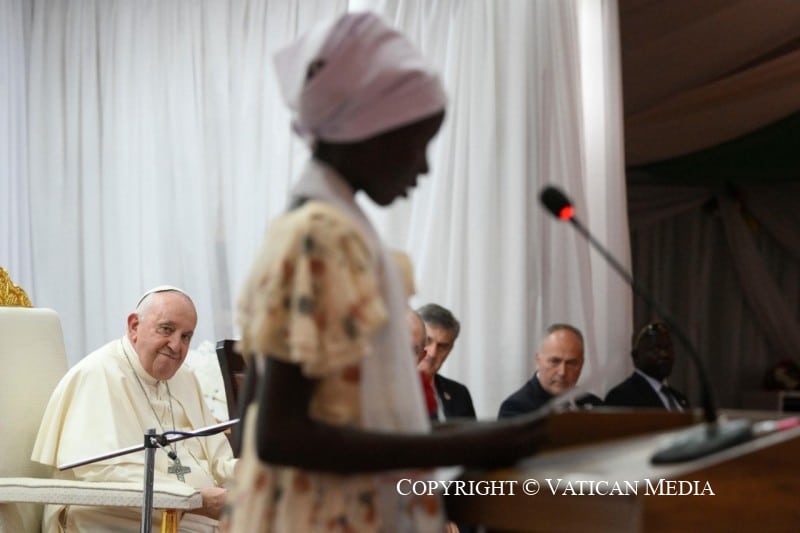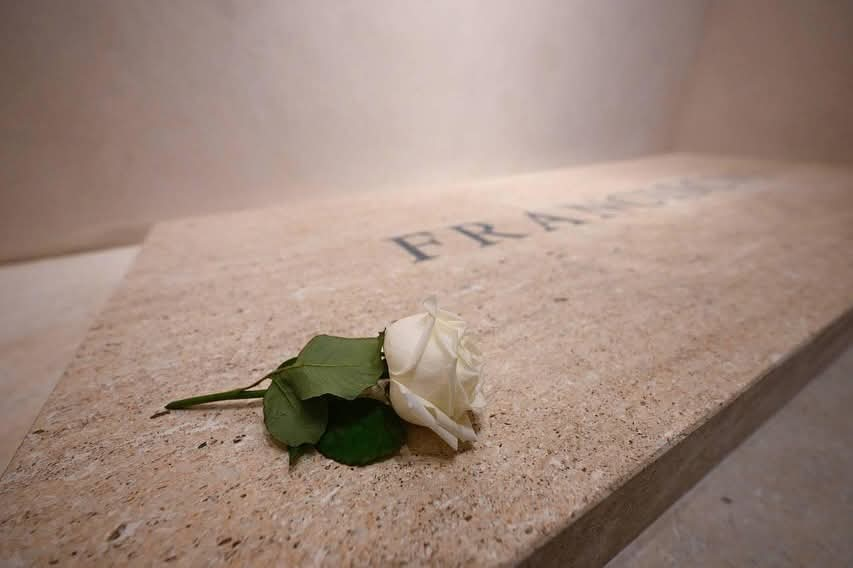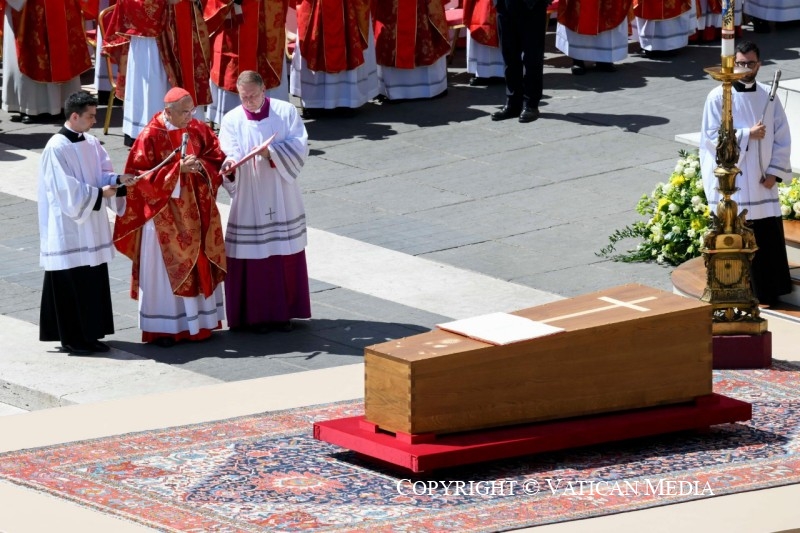“Protect, respect, value and honour every woman, every girl… Otherwise there will be no future”
Pope meets with internally displaced people in South Sudan

This afternoon, the Holy Father Francis leaves the Apostolic Nunciature and moves by car to the Freedom Hall where he meets the internally displaced people at 4.30 p.m. (3.30 p.m. Rome time).
After the opening song and prayer by the Moderator of the General Assembly of the Church of Scotland, Pastor Iain Greenshields, a brief presentation of the group’s present takes place.
Then, after the projection of a video with a commentary by the Deputy Special Representative of the Secretary-General in the United Nations Mission in South Sudan, Resident, and Humanitarian Coordinator for South Sudan, Sara Beysolow Nyanti, a child from Camp Bentiu, a child from Camp Malakal and a girl from Camp Juba bring their testimonies. Then, after the prayer to the Archbishop of Canterbury, His Grace Justin Welby, the Pope delivered his address.
At the end, after the blessing of the three religious leaders and the performance of a dance, Pope Francis moved by car to the “John Garang” Mausoleum for the Ecumenical Prayer. Ecumenical Prayer.
We publish below the speech the Holy Father gave during the meeting with the internally displaced people:
Address of the Holy Father
Dear brothers and sisters, good afternoon!
Thank you for your prayers, your testimonies and your singing! I have been thinking of you for a long time, with a growing desire to have this meeting, to see you face to face, to shake your hands and to embrace you. Now at last I am here, together with my brothers on this pilgrimage of peace, to express to you all my closeness, all my affection. I am with here you, and I suffer for you and with you.
Joseph, you asked a crucial question: “Why do we have to suffer in a camp for displaced persons?” Why…? Why do so many children and young people like you end up here, rather than studying in school or playing in a nice open place? You answered your own question, when you said that it is “because of the ongoing conflicts in the country”. Due to the devastation caused by human violence, as well as that caused by the floods, millions of our brothers and sisters like you, including many mothers with children, have had to leave their lands and abandon their villages and their homes. Sadly, in this war-torn country, being a displaced person or a refugee has become a common and collective experience.
That is why I want to renew my forceful and heartfelt appeal to end all conflict and to resume the peace process in a serious way, so that violence can end and people can return to living in dignity. Only with peace, stability and justice can there be development and social reintegration. There is no room for further delay: great numbers of children born in recent years have known only the reality of camps for displaced persons. They have no memory of what it means to have a home; they are losing their connection with their native land, their roots and their traditions.
The future cannot lie in refugee camps. As you said, Johnson, there is a need for all children like yourself to have the opportunity to go to school – and to have a field to play football! There is a need for you to grow as an open society, for different groups to mingle and to form a single people by embracing the challenges of integration, even learning the languages spoken throughout the country and not just those in your particular ethnic group. This means embracing the marvellous risk of knowing and accepting those who are different, discovering the beauty of a reconciled fraternity and experiencing the thrilling challenge of freely shaping your own future along with that of the entire community. It is absolutely essential to avoid ostracizing groups and ghettoizing human beings. To meet all these challenges, however, there is a need for peace. And for the help of many, indeed of everyone.
I would like to thank Deputy Special Representative Sara Beysolow Nyanti for telling us that today represents an opportunity for people to realize what has been going on for years in this country. A country with the greatest enduring refugee crisis on the continent: at least four million children of this land are displaced; food insecurity and malnutrition affect two-thirds of the population, and forecasts predict a humanitarian tragedy that could further worsen in the course of this year. So I would like to thank you, above all because you and many others did not sit around analysing the situation, but went straight to work. You, Madam, have travelled throughout the country; you have looked into the eyes of mothers and witnessed the pain they feel for the situation of their children. I was moved when you said that, despite all that they are suffering, smiles and hope have never faded from their faces.
I also agree with what you said about them: mothers, women are the key to transforming the country. If they receive the proper opportunities, through their industriousness and their natural gift of protecting life, they will have the ability to change the face of South Sudan, to give it a peaceful and cohesive development! I ask you, I ask all the people of these lands, to ensure that women are protected, respected, valued and honoured. Please, protect, respect, appreciate and honour every woman, every girl, young woman, mother and grandmother. Otherwise, there will be no future.
Brothers and sisters, once more I look out at you. I see your eyes, weary but bright, eyes that have not lost hope. I see your mouths, which have not lost the strength to pray and to sing. I see you with empty hands but hearts full of faith. You bear the burden of a painful past, yet you never stop dreaming of a better future. In our meeting today, we would like to give wings to your hope. We hope and believe that now, even in the camps for displaced persons, where sadly you are forced to live due to the situation in your country, a new seed can sprout, as from the dry and barren soil: a new seed that will bear rich fruit.
That is what I want to tell you: that you are the seed of a new South Sudan, a seed for the fertile and lush growth of this country. You, from all your different ethnic groups, you who have suffered and are still suffering, you who do not want to respond to evil with more evil. You, who choose fraternity and forgiveness, are even now cultivating a better tomorrow. A tomorrow that is being born today, wherever you find yourselves, from your ability to cooperate, to weave webs of communion and paths of reconciliation with those who, while different from you in terms of ethnicity and origin, are your neighbours. Brothers and sisters, be seeds of hope, which make it possible for us already to glimpse the tree that one day, hopefully in the near future, will bear fruit. Yes, you will be the trees that absorb the pollution of years of violence and restore the oxygen of fraternity. True, right now you are “planted” where you don’t want to be, but precisely from this situation of hardship and uncertainty, you can reach out to those around you and experience that you all are rooted in the one human family. From here, you must make a new start, to realize that you are all brothers and sisters, children on earth of God in heaven, the Father of us all.
Dear friends, to speak of roots reminds us that every plant springs up from a seed. It is a beautiful thing that people here care deeply about their roots. I remember reading that in these lands “the roots must never be forgotten”, because “the ancestors remind us who we are and what our path should be… Without them we are lost, frightened and without a compass. There is no future without a past” (C. CARLASSARE, La capanna di Padre Carlo. Comboniano tra i Nuer, 2020, 65). In South Sudan, young people grow up benefitting from the stories of the elderly and, although the chapter of recent years has been one of violence, it is possible, and indeed necessary, to launch a new chapter, starting with yourselves. A new chapter of encounter, which does not forget past sufferings, but radiates the joyful light of fraternity; a chapter that does not focus only on reports of tragedy, but on the ardent desire for peace. May you, young people of different ethnicities, write the first pages of this new chapter! Although conflict, violence and hatred have replaced good memories on the first pages of the life of this Republic, you must be the ones to rewrite its history as a history of peace! I thank you for your strength and perseverance, and for all the good you do, which is so pleasing to God and enriches each day of your lives.
In addition, I would like to address a word of gratitude to all those who help you, often in conditions of hardship, but also in emergency situations. I thank the ecclesial communities for their efforts, which deserve to be supported. I thank also the missionaries and the humanitarian and international organizations, in particular the United Nations, for the important work they do. To be sure, a country cannot survive on external means of support, especially if it possesses a territory so rich in resources! At the present time, however, those means of support are badly needed. I would also like to honour the many humanitarian workers who have lost their lives, and to plead for respect for those who offer help and for the structures that assist the population; they should not become targets of assaults and vandalism. Together with urgently needed aid, I believe that it is very important, in the future, to accompany the population on the path of development, for example by helping them to learn up-to-date practices in the areas of agriculture and livestock management, so as to facilitate a more independent growth. I plead with everyone from the heart: let us help South Sudan; let us not abandon its population. They have suffered and they continue to suffer so greatly!
In conclusion, I would like to mention the many South Sudanese refugees living outside the country and those who cannot return because their territories have been occupied. I am close to them and I trust that they can once again take an active role in shaping the future of their land and contribute to its development in a constructive and peaceful manner. Nyakuor Rebecca, you asked me for a special blessing upon the children of South Sudan, precisely so that all of you might grow up together in peace. The three of us, as brothers, will give the blessing: together with my brother Justin and my brother Iain, we will give all of you the blessing. With it comes the blessing of so many of our Christian brothers and sisters in the world, who embrace and encourage you, knowing that you, your faith, your inner strength and your dreams of peace, radiate all the beauty of our shared humanity.
Related

Timothy Schmalz, the Pope’s Sculptor
Exaudi Staff
29 April, 2025
7 min

Cardinal Parolin at the Novendalia Mass: “Mercy leads us to the heart of faith”
Exaudi Staff
27 April, 2025
8 min

Pope Francis’ Tomb in Santa Maria Maggiore
Exaudi Staff
27 April, 2025
1 min

Mercy and the joy of the Gospel are two key concepts of Pope Francis
Exaudi Staff
26 April, 2025
9 min
 (EN)
(EN)
 (ES)
(ES)
 (IT)
(IT)

